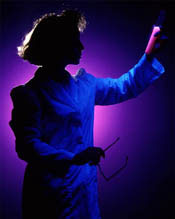
Seeking a Way to Counter AutismBY JAKE REMALY CHESTER TWP. — For the last seven years, Bertie Lowenstein traveled all over the country looking for ways to treat her 9-year-old son's autism. On April 1, her son, after having his brain mapped in March, began taking FDA approved medications in very unique combinations, as prescribed by Philip A. DeFina, a neuropsychologist who lives in Chester Township. Now, she sees a big change in her son's behavior and self-esteem: He no longer screams, pulls hair or bites at school, she said, and he seems much happier. “This is the first thing I've seen that's extremely positive,” said Lowenstein, who lives in Aspen, Colo. Autism is a complex developmental disability that affects an individual in the areas of social interaction and communication. While the condition is treatable, there is presently no cure. Autism is a spectrum disorder that affects each individual differently and to varying degrees of severity. As many as 1.5 million Americans are thought to have autism today, according to the Autism Society of America. “The basis of the treatment was understanding the child's brain through real-time brain imaging technology,” DeFina said. “Doctors then worked to balance the brain's electrochemistry using available medications followed by specific brain-based educational programs,” DeFina said. Foundation founder DeFina, a neuropsychologist for 27 years and a professor at New York University, is the founder, chief executive officer and chief scientific officer for the year-old International Brain Research Foundation. Its goal is to support, share and advance medical research on brain health worldwide. “We're ready and able to do this with more kids now,” DeFina said in an interview at his home on Wednesday. However, “to do this kind of work, however, takes millions (of dollars),” he said. Money that the foundation does not have for autism research. The foundation is hoping to change that with its first fundraiser, held at the Desiderio Tranquility Farm in Chester on June 24 from 4 to 8 p.m., and with two more fundraisers being held in New York in the coming months. The event, which costs $200, will feature wine tasting, cocktails and catered food like lamb chops and salmon cakes, Lorraine Cancro, director of development for the foundation, said. There will also be auctions and live classical and jazz music. Those interested can contact Cancro at (212) 505-3400. Cautious optimism Foundation focus Cases in progress The three cases Jake Remaly can be reached at (973) 428-6633 or jremaly@gannett.com. Back to News & Events page |

|
Questions?Contact IBRF by email or call 732.494.7600 or 888.505.3401. | ©2005-2009 International Brain Research Foundation, Inc. |